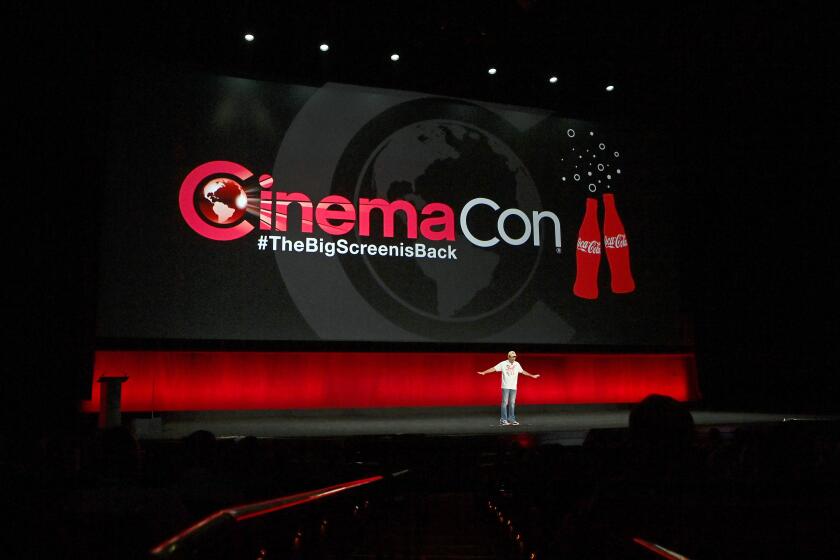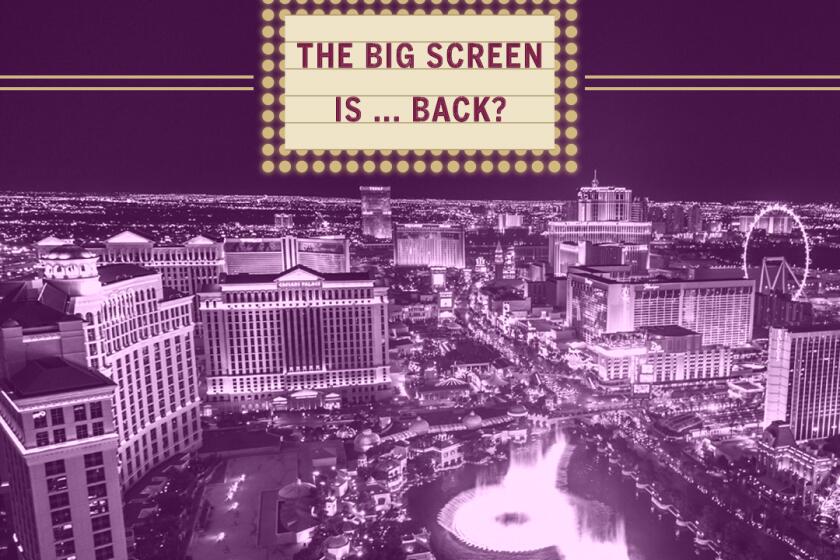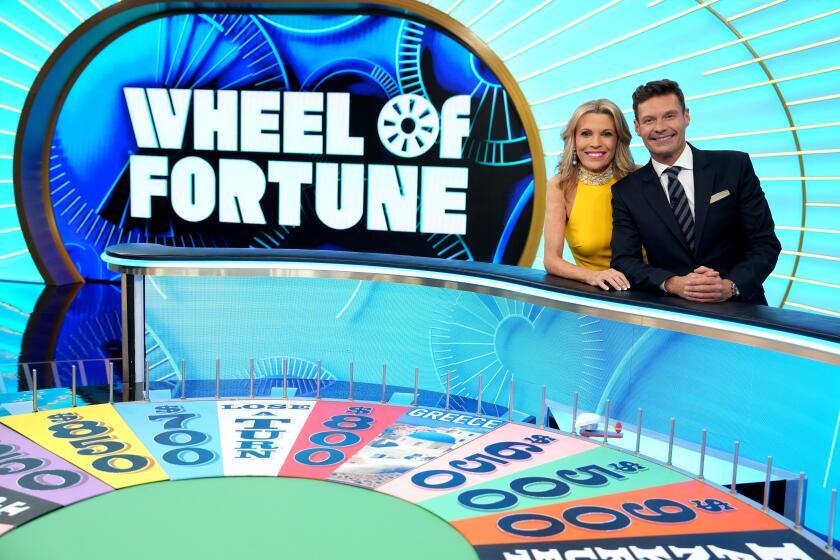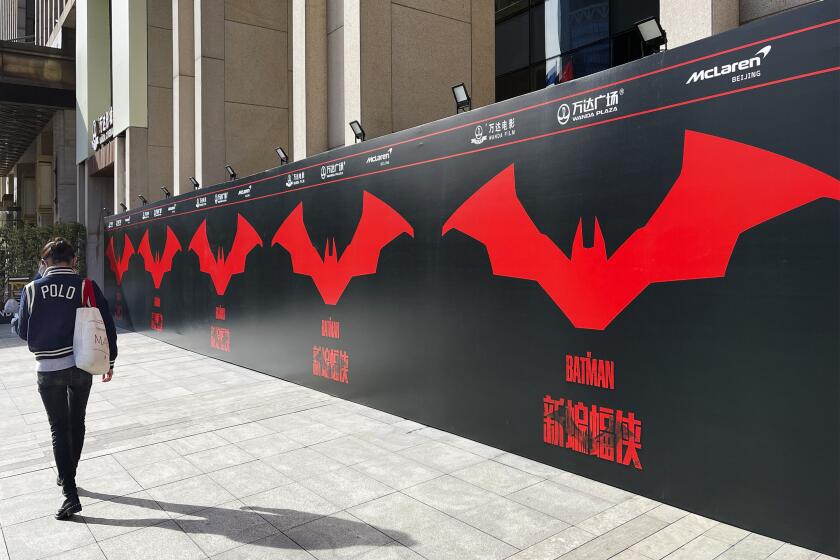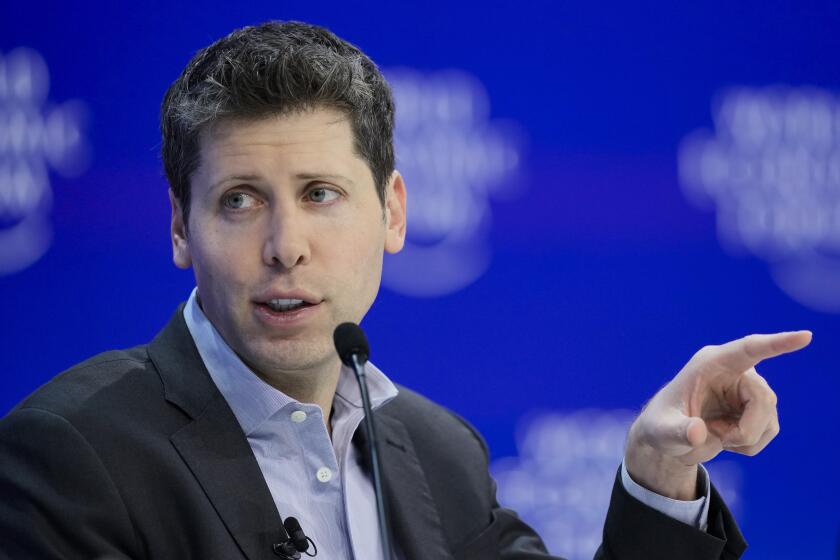Theater owners gathered in Las Vegas amid Hollywood changes. Here’s what we saw
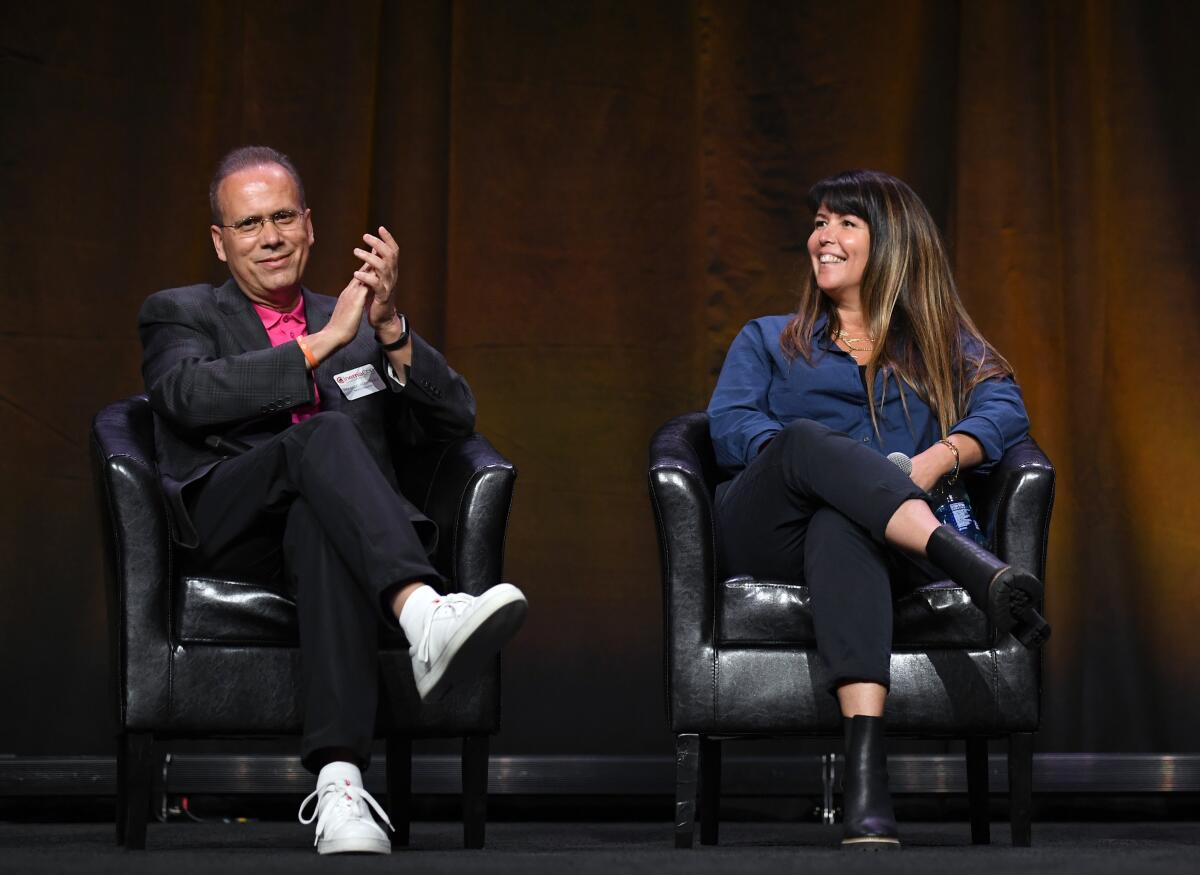
- Share via
It had been a few years since Sandy and Dave Schoenborn, the owners of the three-screen Lincoln Theatre in Belleville, Ill., trekked to CinemaCon, the annual convention of the movie industry in Las Vegas.
But after a pandemic that crippled cinemas, scrambled blockbuster releases and dampened attendance, the couple decided this was the year to return. On Wednesday, they walked the aisles of the trade show floor of Caesars Palace, where vendors handed out popcorn samples and showed off the latest in recliner seating.
Inside the business of entertainment
The Wide Shot brings you news, analysis and insights on everything from streaming wars to production — and what it all means for the future.
You may occasionally receive promotional content from the Los Angeles Times.
“Illinois has been open since June 11, but attendance has been around here,” said Dave Schoenborn, waving his hand down near his knee to show that business had not recovered. “We decided to come this year because we thought it was kind of important to kind of catch up, meet some people again and see what people are doing.”
The challenges faced by the Schoenborns, who took over the Lincoln Theatre from Sandy’s father in 2007, reflected the broader vibe of this year’s CinemaCon, which came amid a wave of disruption. Studios are making more movies for affiliated streaming services, and some audiences are still hesitant to return to auditoriums because of COVID-19, or because they simply got out of the habit.
In panel discussions and closed door meetings, studio and theater executives debated how best to bring attendees back to the big screen, the impact of streaming and whether the big fall movies — like “Top Gun: Maverick” — will stick to their current release dates amid the spreading Delta variant.
During studios’ presentations at the Colosseum, executives played to the diminished crowd with paeans to the importance of the “theatrical experience” and effusive thank-yous for keeping the lights on. The number of times speakers invoked the need for people to be together sometimes made the event feel like an industrywide group therapy session.
Here are our five key takeaways from the event.
Theaters contend with a changing business
There was no surer way to get a round of applause from theater owners than to vigorously defend the practice of releasing movies in theaters long before they’re available online — the treasured theatrical window. The exclusive theatrical window came under threat during the pandemic as Warner Bros. released all its 2021 movies to HBO Max and theaters at the same time. Walt Disney Co., Universal Pictures and Paramount Pictures also tried same-day premieres, known as day-and-date releases.
“Show movies in movie theaters first,” AMC Theatres CEO Adam Aron said repeatedly in a Tuesday speech.
Will the cinema business bounce back?
“Wonder Woman 1984” director Patty Jenkins, whose movie was the first Warner Bros. film to go to HBO Max and theaters simultaneously under the controversial plan, criticized the model at a Thursday panel discussion hosted by the Los Angeles Times. While she called the decision to premiere “Wonder Woman 1984” on streaming “the best choice out of a lot of bad choices at that moment,” she said not having a full exclusive run in theaters was “heartbreaking” and “a detriment to the movie.”
“I’m not a fan of day-and-date, and I hope to avoid it forever,” Jenkins said, to cheers from the lunchtime crowd. “I believe in the theatrical experience, and I don’t understand why we’re talking about throwing it away for 700 different streaming services that there’s no room for in the marketplace.”
But she didn’t leave theaters or other studios off the hook either, saying the experience of going to theaters has declined, as has the variety of the movies offered by Hollywood studios. She critiqued theaters for allowing screen and sound quality to diminish, and hit studios for increasingly giving up on genres like adult dramas.
“In my lifetime, I have watched diversity of content plummet,” Jenkins said. “You can have six theaters in a town, even in Los Angeles, and they’re all playing the same three movies. The quality of the screens has gone way down. And so it’s made it a less appealing experience for people. ... People will always want to go to the theater and I believe in the theatrical industry as a stand-alone thing and I’m excited to fight for it and to fight for it together.”
Studios are largely going back to theatrical exclusivity for their big films. One remaining question mark is Disney, which recently disclosed in a legal filing that “Black Widow” generated $125 million in online sales. Disney’s next film, “Shang-Chi and the Legend of the Ten Rings,” is getting a 45-day theatrical window. Theaters hope that remains the norm.
Piracy gone wild
A major concern for exhibitors is the rate at which movies that premiere on streaming services are quickly pirated, with pristine copies of new studio films including “The Suicide Squad” and “Jungle Cruise” appearing on illegal sites shortly after release. That has a significant effect on box office returns, theater owners said.
Motion Picture Assn. CEO Charles Rivkin cited a Wall Street Journal report noting that “Black Widow” was the most pirated movie in the world for three weeks after its release, according to piracy tracking site TorrentFreak. Prerelease piracy of movies can reduce box office by nearly 20%, he said. It’s not just movies that premiere on streaming sites early, said Rivkin, whose members include the major studios as well as Netflix. Stream-ripping, the practice of stealing higher-quality permanent versions of movies from online streams, is a major problem, he said.
Hollywood and Silicon Valley are contending with the issues through the Alliance for Creativity and Entertainment, a coalition of studios and streaming services including Apple TV+ and Amazon Prime. The group works with law enforcement agencies to shut down intellectual property thieves, including stream-ripping operations. “We’re fighting like hell to solve this problem,” Rivkin said.
A quiet place
This year’s CinemaCon was noticeably subdued compared with previous gatherings, as most studios declined to fly out the big movie stars who normally appear to entertain theater owners. Instead, distributors played recorded videos of big name actors extolling the magic of the movies.
Universal featured a video, introduced by Matthew McConaughey, in which the likes of Jamie Lee Curtis, Lupita Nyong’o and Jake Gyllenhaal paid tribute to theater workers. “There’s a place for watching movies at home, but there’s nothing like watching a movie on a big screen,” Gyllenhaal said. “I am evangelical about the belief that there is no better way to watch a movie,” said “Last Night in Soho” director Edgar Wright from the Colosseum screen. Curtis introduced the manager of the Magic Lantern Cinema of Ketchum, Idaho, who spoke about being traumatized by John Carpenter’s original “Halloween,” Curtis’ breakout role.
CinemaCon kicks off in Las Vegas at the weirdest possible time for the movie business. Plus: Rachel Maddow stays with MSNBC.
Attendance was light, despite Regal Cinemas sending 500 of its general managers to the show (the plus side: shorter lines for coffee). Walt Disney Co. declined to send executives, citing concerns about the pandemic.
Early in the festivities, cinema operators were invigorated by Sony Pictures’ opening-night presentation on Monday, which included a staunch defense of the theatrical experience from motion picture chair Tom Rothman and marketing and distribution chief Josh Greenstein. (Sony is the only major studio without a big streaming service.) The studio also brought Ivan and Jason Reitman onstage to introduce “Ghostbusters: Afterlife,” marking one of the few in-person showings by Hollywood talent. But multiple attendees noted, with irony, that Sony had sold several movies to streaming services during the pandemic, including “Greyhound” and “Cinderella.”
Despite the muted gathering, exhibition pros said they were pleased that the show went on. “I think this needed to happen to bring some normalcy, a little bit, to the industry,” said Jack Kline, former CEO and chairman of cinema technology company Christie. “It’s a struggle for attendance, but I think it had to happen.”
Sparring over ticket prices
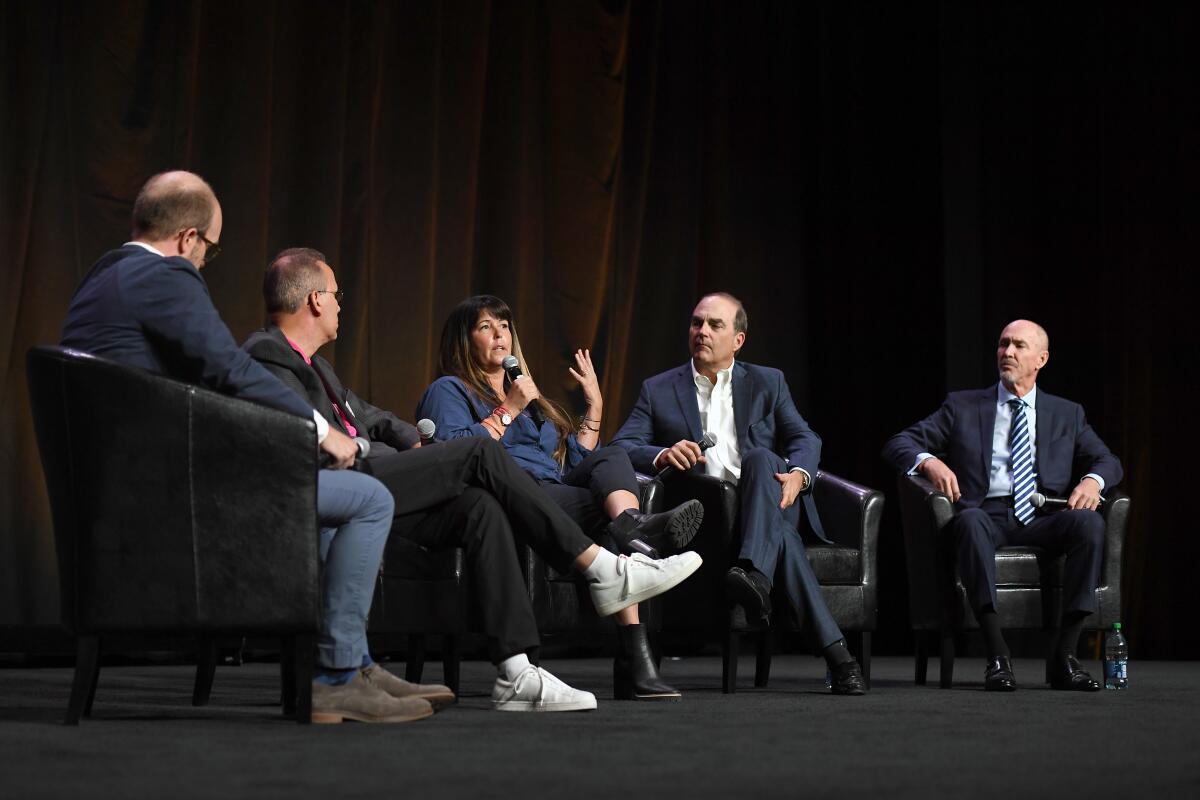
As people start to go back to theaters, they’re gravitating toward the kinds of screenings they can’t replicate at home, including Imax and other premium large-format options, according to executives. Kline, now a consultant working with a Chinese immersive big-screen joint venture called Cinity, said he expects high-end screenings to dominate.
“[Audiences] have been sitting in front of a small screen at home for a year and a half,” he said. “They want to be entertained by a big screen and the wow factor you get from a premium presentation.”
Some industry veterans fear that means moviegoing will become more expensive and less frequent, accelerating a long-term trend of smaller U.S. audiences and higher prices.
Marcus Theatres Chief Executive Rolando Rodriguez on Thursday’s L.A. Times panel countered that moviegoing remains highly affordable compared with sporting events and concerts. Paramount’s president of domestic distribution, Chris Aronson, disagreed.
“Pricing is an issue in our industry. It just is,” Aronson said. “If we revert to premium formats only, attendance is going to continue to go down and down and down.”
Rodriguez conceded the need for more flexible ticket pricing. He touted Marcus Theatres’ $5 Tuesday ticketing option and invited Aronson to a screening. “I’ll give you the popcorn myself,” he quipped.
Scarlett Johansson and Walt Disney Co. are locked in a legal fight and war of words over “Black Widow’s” online release. It’s the latest flashpoint where talent pay practices have yet to catch up to broader industry changes.
Hype for new movies
Theaters live and die on the belief that audiences will return en masse when there’s something they want to see. And there’s still a backlog of long-delayed films coming out in fall and beyond that could do the trick if they’re released soon, as planned. With the Delta variant, that might be a big “if,” but National Assn. of Theatre Owners CEO John Fithian expressed confidence that “the fall and winter film slate is going to hold.”
So what’s it going to be?
Disney screened “Shang-Chi,” which has strong reviews ahead of its Labor Day weekend opening. MGM said it will, indeed, release the next James Bond movie “No Time to Die” in the U.S. in October and showcased an intense car chase from the Daniel Craig spy film.
Warner Bros. unveiled the first trailer for “Matrix 4” (now titled “Matrix Resurrections”) and showed off a scene from Denis Villeneuve’s ambitious adaptation of “Dune,” which features stunning visuals. Universal touted the Illumination Entertainment animated musical “Sing 2,” the sequel “Halloween Kills” and the latest Blumhouse feature, “The Black Phone,” featuring Ethan Hawke in a rare turn as the bad guy.
Paramount’s show was typically heavy on Tom Cruise action, with a lengthy behind-the-scenes video on Cruise’s long preparation for a vertigo-inducing stunt in the next “Mission: Impossible” movie. In the video, the actor prepares for a year before riding a motorcycle off a cliff in Norway, flying off the bike in midair. Paramount followed that up with the first 13 minutes of “Top Gun: Maverick” (scheduled for November), followed by the film’s new trailer.
More to Read
Inside the business of entertainment
The Wide Shot brings you news, analysis and insights on everything from streaming wars to production — and what it all means for the future.
You may occasionally receive promotional content from the Los Angeles Times.
